
INSTRUCTIONS FOR
CLEVELAND MIXER
MAINTENANCE
RXT & APD AGITATORS
RXT O&M 06/25/2015 JMN
INSTALLATION,
OPERATION &
Models: RXT, RXTO, RXTS,
RXTM, RXT - 2M
Models: APD, APDO, APDS,
APDM, APD-2M, SDM, SDS

PAGE INDEX
PAGE TOPIC
1 RECEIVING/UNPACKING
2 INSTALLATION PREP, PRE INSTALLATION CHECK LIST
3 FASTENERS, BOLT TORQUE VALUE CHART
4 REDUCER LUBRICATION DETAILS
5 PLUS, COMMISSIONING, LONG TERM STORAGE
6 SDM FILL QUANTITY
7 APD FILL QUANTITY
8 RXT FILL QUANTITY
9 LUBRICATION CHART
10 INSTALLATION NOTES-
11-11b FIXING ELEMENT INSTALLATION
12 - 13 INSTALLATION NOTES
14 EXPANSION CHAMBER
15 AUTO LUBRICATOR
16 STEADY BEARING TRIPOD ASSEMBLY
17 PACKING GLAND/STUFFING BOX SEALS
18-19 IMPELLERS AND COUPLINGS
20 SIDE ENTRY MIXERS
21 SIDE ENTRY MIXER SHUT-OFF PLUG
22 TROUBLE SHOOTING
RXT O&M 06/25/2015 JMN

PAGE 1
RXT & APD AGITATOR MANUAL_09-17-15_JN
document the issue.
damage. Once you've contacted the carrier, please contact Cleveland Mixer so we can
delivered with visible damage, please contact the carrier to report the missing pieces or
correct number of skids, crates and cartons. If any of the shipment was not delivered or
Make sure to check the packing slip for your shipment to make sure you've received the
assembly.
discard any packing crates or materials until you've accounted for all the parts of your mixer
mixer accessories may be packed in boxes inside of crates or bolted down to skids. Do not
such as impeller blades, hubs, couplings, steady bearings, seals, keys, hardware and other
Be sure to use care when uncrating, unpacking, lifting and handling your mixer. Certain parts
RECEIVING AND UNPACKING YOUR MIXER
them on a level surface preferably indoors or
in a clean dry location.
Some mixer parts such as shaft pullers are
supplied to perform future maintenance.
Cleveland Mixer suggest labeling these parts
and putting them into storage.
The weight of the mixer will be indicated on
the mixer's assembly drawing and also in the
shipping documents. It's important that the
mixer be moved and installed by
professionals. Any attempt to lift or move the
mixer by an unqualified party can result in
serious injury and catastrophic damage to the
mixer.
The drive end of the mixer might be top
heavy. Never upright a mixer drive without the
proper bracing. Doing so might result in the
drive falling over and causing injury or
damage to equipment.
Never lift the drive end of the mixer by the
motor. Make sure when lifting shafting to keep
the ends level so not to bend the shafting.
After uncrating the mixer and parts, stage
Cleveland Mixer suggests checking
your unpacked mixer assembly parts
against your packing slip and
assembly drawing to make sure
everything is accounted for before
assembling your mixer.

INSTALLATION SITE
Mixer drives must be properly installed if they are to produce the rated torque. Improper
installation may lead to oil leaks, reduced life or even catastrophic failure. Cleveland Mixers
are intended to be installed under the following conditions:
Unimpeded airflow to and around the mixer.•
Accessibility to oil drain, motor, seal and breather plugs.•
Mounting surfaces must be level, torsional rigid and dampened against vibration.•
Unless special measures are taken, the immediate vicinity around the mixer drive should•
not be exposed to any aggressive or corrosive substances or gases.
If the mixer has a steady bearing, the shaft and tripod must be properly aligned.•
All bolt connection surfaces must be clean and free from contamination or corrosion.•
Tank walls must be designed to withstand forces created by the mixer.•
Sufficient headroom over the mixer for installation and to be able to perform annual•
maintenance on the mixer.
Designed input voltage or air pressure to run motor. Access to flush materials for seals•
when required.
The responsibility for the design and construction of the support foundation and tank is with
end user. The foundation must be adequate to withstand normal operating loads and possible
overloads while maintaining alignment to attached system components under such loads.
An engineered structural steel foundation should be designed to provide adequate rigidity
and prevent loads from distorting the housing or cause misalignment of internal gears and
shafts.
When flange-mounting the mixer, the bulk head plate must be engineered to minimize
buckling distortions and support the cantilevered weight of the mixer.
If a concrete foundation is used, allow the concrete to set firmly before bolting down the
mixer. Grout structural steel mounting pads and bolts of sufficient size into the concrete to
adequately distribute the load stress onto the concrete foundation.
The mixer must be mounted in the designed position in order to stay properly lubricated.
Consult Cleveland Mixer before making any changes to the mixer or mounting position.
PRE INSTALLATION CHECK
Mixers are unpacked and all parts are accounted for•
The installation site meets requirements listed above•
A professional is onsite with the correct equipment to safely and securely lift the mixer•
and it's components into position
A professional electrician is onsite to wire the motor/drive•
You have all the necessary tools to install the mixer including a torque wrench (reducer•
hardware will be metric)
You've read through the O&M manual for the mixer, the manual for the motor and•
manuals for mechanical seal or speed drive (if applicable).
The tank is empty, clean and you have access to work inside to install impellers.•
(if your mixer was supplied with a steady bearing assembly) Your steady bearing tripod•
has been laser aligned with the mixer shaft and welded in it's designated location.
RXT & APD AGITATOR MANUAL_09-17-15_JN
PAGE 2

USA
Standard
GRADE 5 GRADE 8 316 STAINLESS STEEL
THREAD
SIZE
FT LB DRY
FT LB
LUBED
FT LB DRY
FT LB
LUBED
FT LB DRY
FT LB
LUBED
1/4-20 8 6.3 12 9 6 5
5/16-18 17 13 24 18 11 10
3/8-16 30 23 45 35 20 17
7/16-14 50 35 70 50 33 28
1/2-13 75 55 110 80 45 38
9/16-12 110 80 150 110 59 50
5/8-11 150 110 210 160 96 82
3/4-10 260 200 380 280 131 111
7/8-9 430 320 600 450 202 172
1-8 640 480 910 680 299 254
FASTENERS
Tighten all fasteners to the values shown unless specifically instructed to•
do otherwise.
Lubricate all fasteners at assembly with grease, oil or anti-seize material•
If fasteners cannot be lubricated, use dry torque spec provided on chart.•
Loose hardware can cause catastrophic damage. It is very important to•
check all fasteners at scheduled maintenance intervals.
If your process is corrosive or sanitary check the wetted hardware to•
make sure it is the correct grade before assembly.
Always use washers and lock washers if they were provided.•
Calculated tightening torques are based on conventional 60°F, clean and dry or lubricated
(as indicated above) thread. Standard fasteners will be supplied with a split lock washer.
Cleveland Mixer recommends a minimum of grade 5 (ASTM A449) for all hardware to 1-8 and
grade SAE 8 for larger sizes.
RXT & APD AGITATOR MANUAL_09-17-15_JN
PAGE 3

Oil expansion chamber
connection & oil fill port
(under side)oil drain plug
Cap plate assembly
Oil expansion chamber vent
(rubber plug must be removed for vent to work)
Lower bearing grease port
(motor sizes 250 and up)
Auto lubricator for motor adapter
(motor sizes 250 and up)
Auto lubricator for motor adapter
Oil fill port
(under side)oil drain plug
(under side)oil drain plug
Vertical shaft orientation
Vertical shaft orientation
Horizontal shaft orientation
connection
Oil fill port
Oil fill port Cap plate assembly
Lower bearing grease port
Foot mount
Lower bearing grease port
Cap plate assembly
consult factory for mounting positions not shown, for top/angle mounted units use M5
RXT, APD & SDM STANDARD MOUNTING POSITIONS
Position (top entry)
APD Reducer / M5
RXT Reducer / M5
OIl Grade - synthetic
- measured amount
Oil Level
Position (top entry)
Oil Grade - synthetic
Oil Level - measured amount
Position (side entry)
SDM Reducer / M4
Oil Grade - synthetic
Oil Level - measured amount
REDUCER LUBRICATION
Proper gearbox lubrication is essential in order to reducer friction, heat and moisture. Lubricants reduce heat and wear
by inserting a protective "fluid boundary" between mating parts and preventing direct metal to metal contact.
Lubricants also help prevent corrosion and oxidation, minimize foaming, improve heat transfer, optimize reducer
efficiency, absorb shock loads and reduce noise.
Most reducers used with Cleveland Mixers are shipped from the factory with a pre-determined oil fill level in
accordance to the specified reducer size and mounting position.
Cleveland Mixer recommends an oil change 3 months after startup to flush the gear case of any debris caused by the
reducer's wear-in period. Drain the oil from the reducer, take a look to make sure the oil looks clean and clear (If the
original oil is foamy and burnt looking or has chunks of metal in it, please contact the factory for assistance). Refill the
reducer with the specified measured amount of the specified oil (typical Mobil SHC 630 series). Once the original oil is
changed out, Cleveland Mixer recommends changing the oil and adding grease to the bearings once per year for the
life of the mixer.
Oil viscosity, or the oil's resistance to shear under load, is often considered the single most important property of any
gear oil. You might consider making a change to the oil viscosity to improve performance when operating the mixer in
an extremely low or high temperature. The oil supplied with the mixer from the factory is rated for use with an ambient
temperature range of 31°F-176°F. To prevent the reducer from overheating, the internal temperature of the reducer
should never exceed 220°F.
Routine oil analysis, sound lubrication practices and good tracking of oil performance trends will help extend the life of
your reducer and maximize the workload performance of your mixer. APD units size 4 and up will come with an oil
overflow canister which must be installed. The canister needs to be upright with the hose down toward the reducer. the
canister will have a rubber plug in the breather pin which must be removed before operating.
PAGE 4
RXT & APD AGITATOR MANUAL_09-17-15_JN

PLUGS
AUTO VENT DRAIN PLUG FILL LEVEL PLUG
(MUST BE OPENED BEFORE OPERATING)
COMMISSIONING
Prior to mixer start-up, complete the following:
Check the lubricant and be sure that the gear unit is filled with the•
proper oil type, to the proper level, as determined by the mounting
position (this info will also be indicated on the mixer's ID tag).
Check to make sure all breather vents are open•
Check to make sure the oil expansion chamber (if one was•
provided) is installed correctly.
All mounting hardware is torqued to the appropriate value (not•
torqueing the bolts can create an unbalance).
If a mechanical seal is required, the seal was installed/set according•
to the manufacturer's requirements, the shipping clips are removed,
the seal has lubrication (if it's not a dry running seal), the seal has
been pressure tested.
The motor is wired to run in the correct direction with the•
appropriate voltage and needed amperage to run the motor.
The shaft and impeller assemblies are properly installed. If a steady•
bearing was supplied, the SB was laser aligned with the reducer
output after the reducer was mounted on the tank. The shaft should
be straight to .001" per inch.
The mixer has been test bumped before entering into normal•
operation.
LONG TERM STORAGE
Store the reducer in its designed mounting position in accordance with•
the specified oil-fill level in a clean, dry environment. Avoid temperature
fluctuations within the range of 32°F - 104°F and relative humidity
conditions in excess of 60%.
Keep shaft sections level and flat, preferably crated to avoid warping•
and scoring the metal. Coat the shaft, impellers, hubs, keys, couplings
(any metal parts) etc. with grease to prevent rust and corrosion.
(continued on next page)
PAGE 5
RXT & APD AGITATOR MANUAL_09-17-15_JN

LONG TERM STORAGE
(continued from previous page)
Store the mixer in an area away from shock and vibration.•
Once every 2-3 months, rotate the output shaft 10-20 revolutions to keep•
the gears and bearings drying out and seizing up.
Avoid direct exposure to the sun or UV light and aggressive or corrosive•
materials in the environment.
Drain the oil and refill the reducer with fresh oil before putting the mixer•
back into operation.
Your mixers motor will come supplied with it's own set of operating and•
maintenance instructions. Please follow those instructions for long term
storage of the motor.
If your mixer requires a mechanical seal, drive unit or any other•
components supplied with a separate manufacturers operation and
maintenance manual, please follow those instructions for long term
storage of those components.
OIL FILL QUANTITY, MODEL SDM - SIDE ENTRY
MIXER MODEL UNIT OF MEASURE FILL QUANTITY
SDM-2
QUARTS 2.01
LITERS 1.90
SDM-3
QUARTS 3.44
LITERS 3.25
SDM-4
QUARTS 5.02
LITERS 4.75
SDM-5
QUARTS 7.93.
LITERS 7.50
SDM-6
QUARTS 12.68
LITERS 12.00
SDM-7
QUARTS 21.24
LITERS 20.00
SDM-8
QUARTS 31.71
LITERS 30.00
NOTE: SDM units do not require the use of an oil expansion chamber.
The breather plug must be positioned above the oil fill line. Cleveland
recommends changing the oil once per year.
PAGE 6
RXT & APD AGITATOR MANUAL_09-17-15_JN

PAGE 7
RXT & APD AGITATOR MANUAL_09-17-15_JN
MIXER MODEL UNIT OF MEASURE FILL QUANTITY
APD-1
QUARTS 1.27
LITERS 1.20
APD-2
QUARTS 2.11
LITERS 2.00
APD-3
QUARTS 4.33
LITERS 4.10
APD-4
QUARTS 5.71
LITERS 5.40
APD-5
QUARTS 9.30
LITERS 8.80
APD-6
QUARTS 18.50
LITERS 17.50
APD-7
QUARTS 28.50
LITERS 27.00
APD-8
QUARTS 43.30
LITERS 41.00
APD-9
QUARTS 76.10
LITERS 72.00
OIL FILL QUANTITY, MODEL APD - TOP ENTRY
NOTE: APD units size 4 and up require the use of an oil expansion
chamber. The chamber must be installed above the oil fill level with the
hose side down to allow the chamber to drain back into the reducer.
The fill quantities listed above are for APD double reduction gear
reducers. If you have a triple reduction unit (typical for sizes 8 and up)
contact the factory for oil fill quantities, this info will also be stamped on
the mixer's ID tag.
Cleveland Mixer recommends changing the oil once per year. Any unit
with a 250 series motor frame and up will require an autolubricator for
the motor input bearing. The canister must be replaced once per year.

MIXER MODEL UNIT OF MEASURE FILL QUANTITY
RXT-1
QUARTS 1.27
LITERS 1.20
RXT-2
QUARTS 2.43
LITERS 2.30
RXT-3
QUARTS 3.49
LITERS 3.30
RXT-4
QUARTS 6.87
LITERS 6.50
RXT-5
QUARTS 12.2
LITERS 11.5
RXT-6
QUARTS 20.1
LITERS 19.0
RXT-7
QUARTS 20.1
LITERS 19.0
RXT-8
QUARTS 40.2
LITERS 38.0
RXT-9
QUARTS 87.0
LITERS 82.0
OIL FILL QUANTITY, MODEL RXT - TOP ENTRY
NOTE: RXT units do not require the use of an oil expansion chamber.
These are top entry angled, helical bevel units. The other mixers in this
series are vertical helical units.
The fill quantities listed above are for RXT double reduction gear
reducers. If you have a triple reduction unit (typical for sizes 8 and up)
contact the factory for oil fill quantities, this info will also be stamped on
the mixer's ID tag.
Cleveland Mixer recommends changing the oil once per year.
PAGE 8
RXT & APD AGITATOR MANUAL_09-17-15_JN

RXT & APD AGITATOR MANUAL_09-17-15_JN
PAGE 9
LUBRICATION APPROVED OILS CHART
ISO VISCOSITY OIL TYPE
AMBIENT TEMP
RANGE
MOBIL SHELL CASTROL FUCHS
KLUBER
LUBRICATION
VG150
PAO-EP
-22 to 77°F
Mobilgear
SHC150
Omala HD150
Alphasyn
EP150
Gearmaster
SYN150/NA
Klubersynth
EG4-150
PAO
-22 to 77°F MOBIL SHC 629 Omala RL150 Alphasyn 150 NA
Klubersynth
GEM4-150N
FG-PAO
5 to 77°F
MOBIL SHC
CIBUS 150
NA NA Cassida GL150
Klubersoil 4 UH
1-150N
VG220
PAO-EP
-22 to 140°F
Mobilgear
SHC220
Omala HD220
Alphasyn
EP220
Gearmaster
SYN220/NA
Klubersynth
EG4-220
PAO
-22 to 140°F MOBIL SHC 630 Omala RL220 Alphasyn T220 NA
Klubersynth
GEM4-220N
FG-PAO
-13 to 140°F
MOBIL SHC
CIBUS 220
NA NA Cassida GL220
Klubersoil 4 UH
1-220N
VG460
PAO-EP
-4 to 176°F
Mobilgear
SHC460
Omala HD460
Alphasyn
EP460
Gearmaster
SYN460/NA
Klubersynth
EG4-460
PAO
-4 to 176°F MOBIL SHC 634 Omala RL460 Alphasyn T460 NA
Klubersynth
GEM4-460N
FG-PAO
-4 to 176°F
MOBIL SHC
CIBUS 460
NA NA Cassida GL460
Klubersoil 4 UH
1-460N
LUBRICATION APPROVED GREASE CHART
NLGI GRADE GREASE TYPE AMBIENT TEMP MFG BRAND
NLGI GRADE 2
STANDARD -30 to 140°F Mobil Grease XHP222
HIGH TEMP -40-176°F Mobil Polyrex EP 2
FOOD GRADE -22-104°F Mobil SHC Polyrex 222
LUBRICATION NOTES
1. Food grade lubricants must be in compliance with FDA 212 CFR 178.3570 and qualify as a NSF-H1 lubricant. Please consult
with lubrication manufacturer for more information.
2. When making a lubrication change, check with the lubrication supplier to assure compatibility and to obtain recommended
cleaning or flushing procedures.
3. Do not mix different oils with different additive packages or different base oil formulation types. Polyglycol (PG) oils are not
miscible with other oil types and never be mixed with mineral oil or polyphaolefin (PAO) synthetic oil.
PAO-EP (synthetic polyalphaolefin oil w/ EP additive)
PAO (synthetic polyalphaolinfin oil)
FG-PAO (food grade polyalphaolifin oil)

It's good to get measurements of the area around the
mixer and shaft sections to create an installation plan
prior to starting installation. Shaft sections can be long
and heavy. It works best to get them staged in the tank
prior to installing your drive unit. The use of a shaft
catcher to suspend the weight of the shaft while
lowering your drive down can be a helpful aid in
installation.
Your drive unit (reducer, motor, stub shaft and HS
couplings) will (typically) come preassembled from
the factory. It is ok to leave it assembled as you
assemble the rest of the mixer to it. Make sure to
have all of your hardware and tools handy for
connecting the mixer sections together. Torque all
the bolts to the required values to help keep the
components aligned.
ASSEMBLY OF TOP ENTRY MIXERS
The RXT and APD models are mixers that mount to the top of a tank, possibly by a
flange connection to the tank nozzle or suspended on beams above an open top
tank.
All RXT and APD models are designed and built custom to the requirements of
each individual process. It's possible the mixer you are installing will look different or
have additional or fewer components than what is shown in this manual. This
manual covers basic installation of our most common designs.
The size of your mixer is directly effected by the tank volume, tank shape, desired
level of agitation and fluid viscosity. Some mixers are supplied with a single direct
input mixing shaft and single impeller while other larger agitator set ups come with
multiple shaft sections, multiple impellers, steady bearings assemblies, etc. You can
refer to your approval drawing for the specifics of your agitator.
The following steps must be completed in order to make sure your top mounted
mixer is assembled correctly:
RXT UNIT
TOP MOUNT
Vertical shaft
APD UNIT
TOP MOUNT
Down pumping impellers
Down pumping impellers
Vertical shaft
Multiple impellers assemblies shown. These can be installed
last once the drive end and shafting are secured in place.
Be careful when assembling the impellers. Once the tank is
filled and the impellers are submerged it's not easy to get
back to these to make adjustments.
Seals are the most delicate components in the installation of
an agitator. It's very important that if you have a mechanical
seal, to follow the manufacturers installation instructions
(provided or available online). Do not rest weight on the seal,
do not suspend any of the mixer's from the seal and don't
bang the seal around. Seals have many small, delicate inner
workings that can be easily damaged.
RXT & APD AGITATOR MANUAL_09-17-15_JN
PAGE 10
Helical gearing w/
vertical mounted motor
Helical bevel
gearing w/
horizontal
mounted
motor

RXT & APD AGITATOR MANUAL_09-17-15_JN
PAGE 11
ASSEMBLING THE SHAFT FIXING ELEMENT
For RXT, APD and SDM models with a hollow output shaft, a fixing
element kit will be supplied with your mixer. This kit will include a cover
plate w/ hardware, a cap plate with a lock washer and bolt, a
plastic bore cap, shaft key and a snap ring (not supplied with some
units).
You mixer will have one of the following configurations:
1. A straight shaft, a shaft with a single diameter from end to end. This
is the shaft that will require a snap ring installed in the groove towards
the top of the shaft quill. This snap ring will prevent the shaft from
sliding up through the shaft quill from the thrust of the mixer.
2. A shouldered shaft, a shaft with a step that will sit just below the
lower slow speed seal of the reducer. This shoulder fills the role of the
snap ring used on the straight shaft.
3. A stub shaft, this shaft might be shouldered or straight. It's a short
shaft with a coupling a longer shaft will connect to.
Shouldered Shaft Straight Shaft
Assembly:
1. Slide shaft up into the hollow
shaft quill in the reducer from
the bottom of the reducer.
Keep the key slots lined up.
2. Insert shaft key thru the shaft
quill at the top of the reducer.
so it aligns with the top of the
shaft
3. If you have a shaft that
requires a snap ring, insert the
ring into the snap ring groove
inside the shaft quill. The snap
ring will sit at the top of the
shaft.
4. Insert the cap plate at the
top of the quill, use the lock
washer and bolt supplied to
lock the assembly together.
Torque the shaft bolt.
5. Install the cover cap and
cover plate.
Cover Plate
Cap Plate Bolt w/
Lock washer
Cap Plate
Snap Ring
Shaft Key
Mixer Shaft
Hollow Quill

AA
Collared shaft
Straight shaft
SECTION VIEW - REDUCER SHAFT ASSEMBLY
Shaft collar
against bottom
of reducer
Cap plate
against top
of shaft
Snap ring
inserted. Top of
shaft against
snap ring, cap
plate plate
against snap
ring.
Before inserting your mixer shaft into your gear reducer, Cleveland Mixer recommends applying a
lubrication compound to the insertion portion of the shaft, such as Anti-Seize, to prevent the shaft
from galling up and getting stuck inside the hollow shaft. Never force or hammer the shaft into the
quill, the shaft is factory fit to the reducer and should slide in without force.
RXT & APD AGITATOR MANUAL_09-17-15_JN
PAGE 11B

RXT & APD AGITATOR MANUAL_09-17-15_JN
PAGE 12
LOWER SHAFT PARTS
The lower shaft
components such
as lower and
intermediate shaft
sections, hubs and
blades should be
staged inside the
tank prior to
installing the
mixer. If the the
lower and
intermediate shaft
sections are too
large and heavy
to lift without a
crane, you might
need to construct
scaffolding inside
of the tank to
support their
weight.
SHAFT CATCHER
The Cleveland Mixer shaft catcher is a two piece split collar that tensions around the
shaft by tightening down on the 4 cap bolts to lock the catcher in place. Once
tightened around the shaft, the catcher should be able to support the weight of the
shaft (only). It is not designed to support additional weight of impellers or multiple shaft
sections. You might not have been supplied with your order. It is a separate
component designed to aid in installation of shafts for top entry mixers. If you need a
shaft catcher for installation, please contact Cleveland Mixer to order.
When preparing to install your
mixer on your tank, take a
moment to gather all of the
assembly parts and tools you'll
need. Once the mixer and
shaft(s) are suspended, it will
be difficult and possibly
dangerous to halt the
assembly procedure. It's best
to have a complete plan and
all parts accounted for before
beginning the process and
raising the mixer components
off the ground.

STEP 1 - (detail page 11) Use the
mixer mounting flange with a
shaft catcher (or your own
bracing) to suspend the weight
of the mixer shaft. Assemble the
shaft coupling to the mixer
shaft(make sure to torque and
use thread locker on the cap
plate bolts). If there's a
mechanical seal, lip seal or
packing gland be sure these
are in place (not yet locked
down) under the shaft coupling
before assembling the
coupling.
STEP 2 - The gear reducer,
motor, pedestal and stub
shaft will typically be
shipped preassembled from
the factory (if your is not, you
will need to assemble these
parts before completing this
step) in step 2, use the
appropriate lifting
techniques to lift and lower
the drive end of the mixer to
mate with the mixer shaft or
mixer shaft coupling. Use the
fasteners supplied to make
this connection before
resting the weight of the
drive on the bracing or shaft
catcher.
fasten coupling hardware•
remove shaft catcher•
fasten flange hardware•
torque the fasteners•
install seal•
TAPER BORE COUPLING
Assemble to top
of mixer shaft
MIXER DRIVE ASSEMBLED TO TANK FLANGE
RXT & APD AGITATOR MANUAL_09-17-15_JN
PAGE 13
If you're mixer requires a
mechanical seal, you'll
need to set it in place on
the shaft below the shaft
coupling before the shaft
coupling is fastened in
place. Slide the
mechanical seal on the
shaft, carefully so it sits
about the shaft catcher.
You will not need to fasten
the seal to the flange or
lock it to the shaft until the
rest of the mixer assembly is
assembled.

Oil Expansion Canister
Hose input/output to and from
canister from reducer oil supply
Hose
Hose connected to reducer through
reducer vent plug.
Expansion canister vent (remove
rubber plug before operating)
RXT & APD AGITATOR MANUAL_09-17-15_JN
PAGE 14
Oil Expansion Chamber
APD units size 4 and up are supplied with an oil expansion chamber. With the motor mounted vertically
and the gear case filled almost completely with oil in order to lubricate the 1st stage gearing, certain
operating conditions can result in additional oil churning and heating of the air space above the oil
resulting in oil loss. The oil expansion chamber provides a safe overflow area for the expanded oil-air
mixture, thus eliminating excessive pressure build-up, minimizing the formation of foam and preventing
oil-loss through the breather, oil seals, gaskets, etc.
As heat is released from the expanded air-oil mixture contained within the overflow chamber, gravity
allows the oil to be returned to primary gear sump supply, eliminating a critical loss of the oil level (the
expansion chamber must be mounted above the oil fill line with the hose connected down towards the
oil supply so the oil can flow back into the reducer naturally).
APD sizes 4 and up with vertical mounted motors
Connection Detail
SRXT (side or wall
mounted) mixers
with the motor
mounted vertical
must be run with
an oil overflow
chamber just as
the APD units, sizes
4 and up. Mount
the chamber using
the motor adapter
mounting
hardware. Make
sure the canister is
up parallel to the
motor with the
hose towards the
bottom
connecting into
the port, replacing
the vent plug.
SRXT Models

AUTO LUBRICATOR CANISTER (KIT)
P/N APD-28301000
COVER PLATE
HARDWARE
ACTIVATION KEY
Prior to starting your mixer: screw in Auto-
Lubricator activation key and turn it
clockwise until the round plastic ring snaps
off. It's a good idea to record the date of
activation so you know when to replace
the canister.
Once the canister is activated, replace
the cover plate and secure it to the motor
adapter.
AUTO LUBRICATOR ACTIVATION
If you have an APD mixer model with a motor,
frame size 250 or larger, the input adapter will
require an auto-lubricator canister to lubricate the
input adapter bearing.
Your mixer will come supplied with a canister
factory installed. You'll need to activate the
lubricator canister prior to starting the mixer.
An auto-lubricator canister cartridge has a one
year life span. After one year of use you will need
to replace the canister. You can contact
Cleveland Mixer for replacement canisters.
EXPLOSION OF AUTO LUBRICATOR ASSEMBLY
ACTIVATION KEY
RXT & APD AGITATOR MANUAL_09-17-15_JN
PAGE 15

All hardware used to
connect the shaft
couplings must be torqued
to keep the assembly true
Use a level when
connecting the mounting
flange or mount plate to
the tank. If the flange or
plate don't sit completely
level, use shims to get the
level
Use a level when welding
the tripod to the tank
LASER ALIGNMENT
MIXER SHAFT
HARDWARE
BUSHING
BUSHING HOUSING
TRIPOD
RXT & APD AGITATOR MANUAL_09-17-15_JN
PAGE 16
STEADY BEARING ASSEMBLY
LEVEL
LEVEL
If your mixer was supplied with a steady bearing
assembly, the tripod will need to be welded to the
bottom center of the tank. The alignment of the shaft
assembly is very important, the center of the tripod
must be concentric with the center of the mounting
flange or mount plate used to mount your mixer to the
tank. Use a laser to align the tripod with the mounting
fixture before welding, both the tripod and mounting
fixture must sit level on the tank as shown. Weld the
tripod in place prior to assembling your mixer drive and
shaft assembly. When assembling the shaft sections,
make sure to torque the coupling bolts with the values
provided in this manual.
TOP VIEW
FRONT VIEW
EXPLODED ASSY
NOTE: Failure to properly align the mixer shaft with the tripod
from the reducer output to the center of the tank could
result in the following: accelerated wearing of the bushing,
scoring and wear on the mixer shaft, damage to the tripod
including tearing the tripod support welds off the tank which
can lead to catastrophic failure.

(1) packing ring
Split follower
Tension nuts
PACKING GLANDS / STUFFING BOX
"High Pressure - 30-100 PSI"
"Low Pressure - 0-30 PSI"
Cleveland Mixer stuffing box seals are supplied as either "high pressure" with 7 packing rings (the thickness of the
packing is dictated by the shaft diameter) or "low pressure" with a single packing ring. High pressure stuffing box seals
are typically supplied with mixers that are side wall mounted or mounted on a sealed tank with pressure over 30 PSI but
less than 100 PSI. Low pressure stuffing box seals are typically supplied with mixers that are top mounted on sealed tanks
with pressure of less than 30 PSI.
<PARA >1. Packing should always be installed as individual rings and not spiraled around the shaft.
2. Lubricate each ring generously with grease (food grade grease can be used with food grade packing in sanitary
applications).
3. High pressure stuffing boxes have four packing rings, a lantern ring and then three packing rings on top. Once the
gland is packed in that order, slide the split follower down to sit on top of the packing and snug the four nuts just so the
split follower is touching the packing. The lower pressure is the same procedure but with the follower and one packing
ring.
4. Pump the gland full of grease using the grease fitting on the side of the gland. You can pump grease into the gland
until you see it push through the top. Once the gland is completely filled with grease, tighten the split follower nuts
evenly until the gland is sealing properly. The seal is not created by tension from tightening the nuts, the seal is created
by the grease int he packing against the mixer shaft. Over tightening the nuts and pushing the follower down on the
packing can damage the mixer shaft.
5. As the mixer runs and the gland wears in, you'll most likely need to add addtional grease and possibly tighten down
on the split follower nuts slowly and evenly in about 1/2 turn increments.
6. The gland will need to be greased as regularly as needed to keep the seal. This can vary based on the contents of
the tank, the shaft RPM and amount of pressure on the seal.
DRIVE END OF MIXER7. Remember to replace the
pedestal guards and secure
the guards back onto the
pedestal once the packing
gland is set up. You can add
extensions to the grease
fittings through the guards for
ease of access for continued
lubrication.
RXT & APD AGITATOR MANUAL_09-17-15_JN
PAGE 17
Tension nuts w/ flat washers
Split follower
(3) Upper packing rings
Lantern ring
(4) Lower packing rings
Pedestal
Stub shaft or mixer shaft
Grease fitting
Page is loading ...
Page is loading ...
Page is loading ...
Page is loading ...
Page is loading ...
Page is loading ...
-
 1
1
-
 2
2
-
 3
3
-
 4
4
-
 5
5
-
 6
6
-
 7
7
-
 8
8
-
 9
9
-
 10
10
-
 11
11
-
 12
12
-
 13
13
-
 14
14
-
 15
15
-
 16
16
-
 17
17
-
 18
18
-
 19
19
-
 20
20
-
 21
21
-
 22
22
-
 23
23
-
 24
24
-
 25
25
-
 26
26
Ask a question and I''ll find the answer in the document
Finding information in a document is now easier with AI
Related papers
-
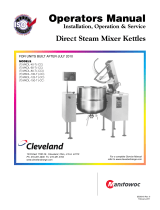 Cleveland SE95018 R6 (Mixer Vertical Direct Steam) User manual
Cleveland SE95018 R6 (Mixer Vertical Direct Steam) User manual
-
Cleveland TMKDL-100-T User manual
-
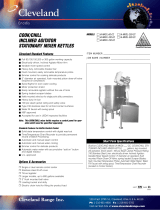 Cleveland IA-MKDL-300-CC User manual
Cleveland IA-MKDL-300-CC User manual
-
Cleveland HAMKDL User manual
-
Cleveland SE55362 R5 (Mixer Vertical Gas) User manual
-
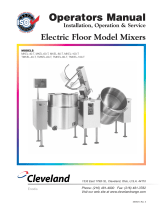 Cleveland TMKEL-40-T User manual
Cleveland TMKEL-40-T User manual
-
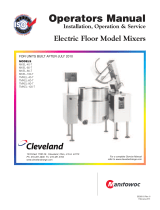 Cleveland SE95013 R6 (Mixer Vertical Electric) User manual
Cleveland SE95013 R6 (Mixer Vertical Electric) User manual
-
 Cleveland MKDL-60-CC User manual
Cleveland MKDL-60-CC User manual
Other documents
-
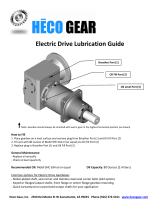 HECO Gear Electric Drive Operating instructions
HECO Gear Electric Drive Operating instructions
-
Husky h4350 Installation guide
-
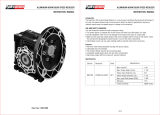 Hydroworks 8607400 Owner's manual
Hydroworks 8607400 Owner's manual
-
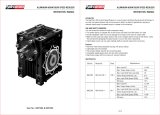 Hydroworks 8607384 Owner's manual
Hydroworks 8607384 Owner's manual
-
Dodge Dodge HSCXT105 Owner's manual
-
Dodge Torque Arm II Metric Speed Reducers Owner's manual
-
Dodge HSCXT4A-6B Owner's manual
-
Regal Browning Shaft Mount TorqTaper Plus Installation and Maintenance Manual
-
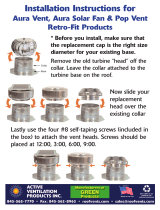 Active Ventilation ASF-14-RF-WD Installation guide
Active Ventilation ASF-14-RF-WD Installation guide
-
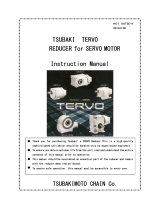 Tsubaki Gear Reducer User manual
Tsubaki Gear Reducer User manual



































